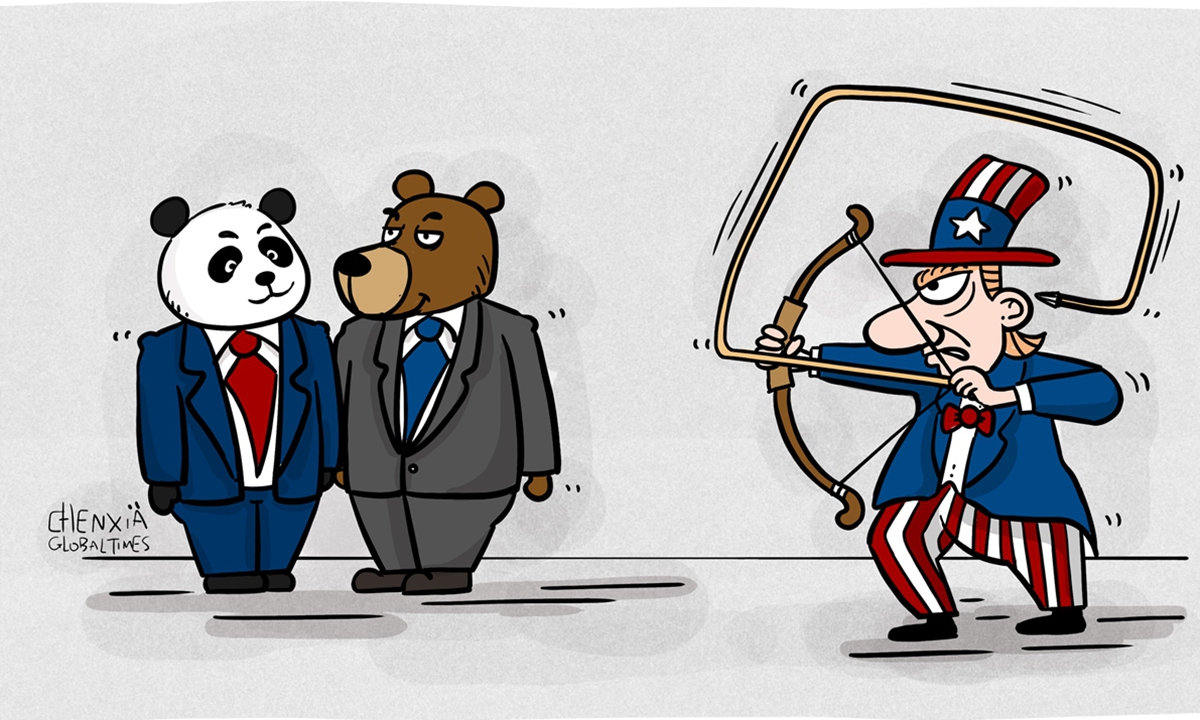
Illustration: Chen Xia/GT
At present, the US is the only country that still wants to use ideology to rule the world, whilst European countries have lost the intention, determination, and ability to do so.
Andrew A. Michta, an American political scientist and expert at the Germany-based George C. Marshall European Center for Security Studies, attributed the Western democracies' "disadvantage vis-à-vis the Russian-Chinese totalitarian axis" to the West's "widespread incredulity about the seriousness of the threat we face [from China and Russia]." He argued it in the piece entitled "China, Russia and the West's Crisis of Disbelief," which was posted recently in the Wall Streets Journal.
Michta's remarks on the ideological division of countries by "democratic versus totalitarian" embody a typical Cold War mindset. Although the Cold War has long ended, such a mentality is still spreading amongst some Americans, said Lü Xiang, a research fellow at the Chinese Academy of Social Sciences.
China is also a democratic country, and it is pretty narrow-minded to classify it as "totalitarian" just because its development path differs from that of the West. Civilizations in the world have blended and learned from each other. Against this backdrop, it is, in fact, unrealistic to provoke struggles between different civilizations and ideologies.
In terms of the West's "widespread incredulity about the seriousness of the threat" from China and Russia, it is not hard to understand. The relationship between countries is more of an exchange of interests. No country is willing to sacrifice itself in order to serve the interests of other countries. Great differences of interest exist not only between Europe and the US, but also within Europe itself. The alliances between some Western countries and the US are ultimately for protecting their own interests. When the US chooses to confront China and Russia, it's impossible for European countries to sacrifice their own interests just in order to remain the alliance system with the US, said Wang Shuo, a professor at the School of International Relations of Beijing Foreign Studies University.
According to Lü, the West's "incredulity" in regard to the seriousness of threat posed by China and Russia mainly stems from their distrust toward the US. American capabilities are declining. After the end of the Cold War, the US has led NATO to take military actions against countries such as former Yugoslavia, Iraq, and Afghanistan to flex their muscles. The US has had no experience of fighting an armed conflict with another major power since the Cold War. Therefore, its military prestige in fact is actually very limited. No one doubts that China and Russia have huge counterattack capabilities. If Europe follows the US in violating the core interests of China and Russia, it will meet strong pushback from China and Russia and the US may not be able to guarantee the security of Europe at that time.
Although Europe is following Washington in sanctioning and getting tough on Russia, Europe differs from the US in their manner toward Moscow. For Europe, Russia is a neighbor that cannot be moved away, but that's not the case for the US.
The ongoing Ukraine crisis demonstrates that when Washington leads NATO to provoke Russia, the biggest victim is Europe. Europe has been severely hit by the spillover effect of the Ukraine crisis - It has to face an energy crisis and soaring prices with key European countries entering a recession, which may spark political and social instability.
China, which lies far away from Europe, is the continent's huge market. Some European enterprises can make even more profits in China than in Europe. Therefore, it is quite normal that many European countries take the "China threat" hyped by the US lightly.
The West's "incredulity" toward the threat from China and Russia can be seen as its own reflections, Lü argued. Europe, represented by Germany, has been committed to building stable relations with China and Russia. But this is what the US is reluctant to see. In response, the US has been sowing discord, using issues such as Ukraine to provoke Europe's ties with Russia as well as exaggerating the so-called China threat to undermine Europe's relationship with China. It is time for Europe to reflect how to consolidate Europe's internal unity, enhance its autonomy and reduce its reliance on the US.
The Biden administration has been stressing Western unity, which, however, proved to be profound disunity in the West and within the US. US political division is becoming more evident. How could Biden unite the whole of the West when the US cannot unite itself? Since the Trump administration emphasized "America First," the US' reputation in the West became bankrupt, and especially so when Washington's purpose to unite the West is to maintain its global hegemony and serve its domestic election agenda. This will only make the West alert.
In such a context, propagating the so-called China or Russia threat in the West can hardly have its desired objectives. The more the US views China and Russia as its enemies, the more difficult it is for the US to unite its allies.
The author is a reporter with the Global Times. opinion@globaltimes.com.cn




